Research Group
Biodiversity & Health
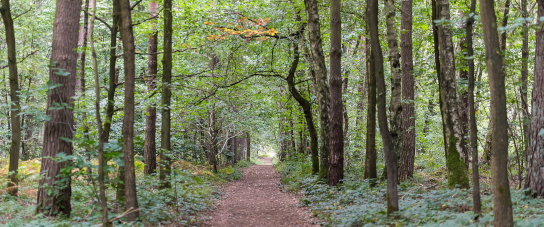
Short description
Exposure to natural environments can offer a suite of benefits to human health and wellbeing. Our working group is dedicated to understanding the mechanisms that underpin these effects, with a specific focus on elucidating the impact of biodiversity on individuals' health and well-being. Through integrating knowledge and methods from different scientific disciplines, we seek to comprehend how biodiversity influences various aspects of human physical and mental health.
We also investigate how people perceive and assign value to biodiversity. We are interested how people engage in environmentally protective behaviors, particularly those concerning biodiversity conservation. Through our research, we aim to provide valuable insights to inform and shape conservation efforts aimed at preserving biodiversity and fostering sustainable environmental practices.
Central to our approach is fostering transdisciplinary collaboration. We recognise that addressing complex issues at the intersection of biodiversity, climate and health requires insights from diverse fields. As such, we draw upon knowledge and methods from environmental psychology, neuropsychology, ecology, climate and public health to develop comprehensive research designs tailored to addressing critical public health and environmental challenges. We use a combination of study designs that range from local to global surveys, fieldwork and laboratory experiments. Through these transdisciplinary and complementary approaches, we strive to contribute meaningfully to the body of knowledge, and to inform evidence-based policies and interventions for the betterment of both human and environmental health.
Projects:
Dr. Forest
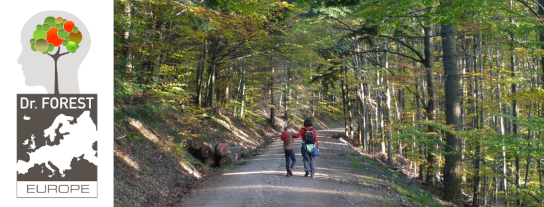
Fresh air and exercise, preferably outdoors in nature, have a positive influence on the health and well-being of people. But is the health-promoting effect in a species-rich mixed forest higher than in a spruce monoculture? In a new pan-European project called “Dr. FOREST,” scientists from the fields of ecology, medicine, biology, forestry and psychology, led by Prof. Dr. Michael Scherer-Lorenzen from the University of Freiburg, are now hoping to find out whether walking through the forest plays a role in how species-rich and diverse it is.
ValuGaps
ValuGaps aims to create a methodological basis for the systematic consideration of the values of biodiversity and natural capital in societal and private decision-making, economic reporting systems and planning in Germany that is scientifically sound, practically feasible and widely accepted by decision-makers. Specifically, ValuGaps aims to (1) identify where decision-makers and stakeholders currently face the largest information gaps and uncertainties in relation to different values of biodiversity and natural capital, (2) develop methods for scaling, transferring and bridging different types of values across (i) space and time, (ii) groups of beneficiaries, (iii) ecosystems and (iv) valuation purposes that transparently account for uncertainties, and (3) work with decision-makers to develop approaches for the best use of natural capital valuation and to specify them for different valuation tasks.
LIFE Adult cohort Analysis
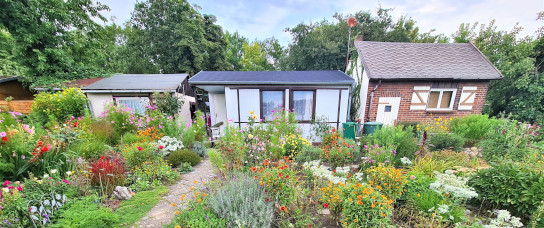
Short description
Urbanisation has emerged as one of the most important global human health challenges of the 21st century (Irvine et al., 2021). In Europe, preventable, noncommunicable disease accounts for 77% of the total disease burden (WHO, 2017), while urban living has been associated with significantly increased risk for mental disorders (e.g. Gruebner et al., 2017). These diseases are expensive to treat (WHO, 2016), but could be mitigated and even prevented through implementing urban nature-based solutions such as the planting of street trees or protection of natural ecosystems (WHO, 2021). Studies have shown that greater exposure to, or contact with, natural environments, such as parks and forests, has been shown to improve physical and mental health (Marselle et al., 2021; van den Berg et al., 2015).
DAAD Australia-Germany Joint Research (DAAD) – using citizen science to benefit nature conservation and human health
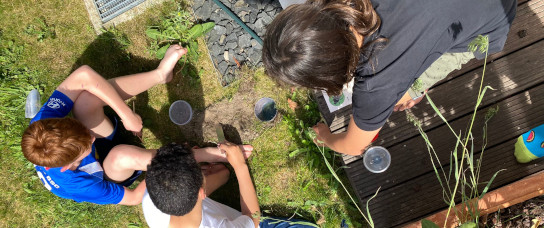
Short description
Citizen science is rapidly proliferating around the world, and is now widely used by decision-makers, non-governmental organisations, and researchers (Welvaert & Caley, 2016). Through engaging many people, citizen science programs can create biodiversity data at a scale not previously attainable. People are also empowered to make meaningful scientific contributions, or use the data to improve their lives (den Broeder et al., 2017). For example, the British Trust for Ornithology (Greenwood, 2005) led bird conservation in the United Kingdom, while Stanford Medicine used data from the Our Voice health initiative to achieve healthier lifestyles (Ceccaroni et al., 2021).
Nature exposure as an equitable, global public health intervention tool –Volkswagenstiftung Symposium
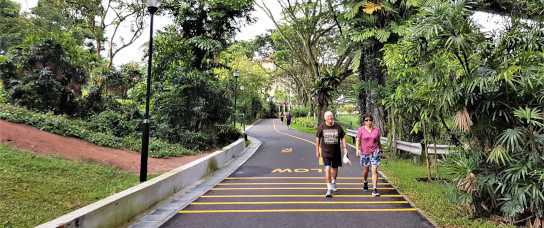
Short description
Healthy, functioning natural environments are crucial to health and wellbeing. Yet both nature and human health are being threatened by climate change. While exposure to nature could form a powerful public health intervention tool, its large-scale application has been impeded by a weak evidence base. This includes inappropriate study designs, analytical methods and biases in study locations. Our collaborative work therefore aims to (i) understand the specific mechanisms of nature–health linkages with focus on how much (e.g. duration, frequency) and what type of nature exposure is needed to achieve health outcomes (ii) identify methodologies for systematic nature-health studies; (iii) develop guidance for inclusive global nature-health research relevant also to - socioeconomically or culturally - underrepresented populations and (iv) propose strategies to engage with society, practitioners, policy makers and researchers.
Further projects
Short description
Growing urbanization is a threat to both human health (Irvine et al., 2021) and biodiversity loss (McDonald et al., 2019). As global urban cover is projected to increase to 1.9 million km2 with 5.2 billion people expected to live in urban areas by 2030 (McDonald et al., 2019), action is needed to reduce future risks to both people and nature.
While urban nature-based solutions, such as the planting street trees or protecting natural ecosystems, can simultaneously provide human wellbeing and biodiversity benefits (WHO, 2021a), there is strikingly little evidence whether and how such nature-based interventions can reduce global health disparities (van den Berg et al., 2015; WHO, 2021b). To address the global health-inequality gap, nature-based strategies and policies should be inclusive, integrated and applicable across the world. This is of crucial importance as the existing evidence of the health benefits of nature is geographically biased towards temperate, high-income settings (Pett et al., 2016), whilst most of the world’s population live in tropical, low- and middle-income settings (Oh et al., 2021; Nawarth et al., 2021).
- Conference Biodiversity and Health in the face of Climate Change
- Exploring the pathways linking biodiversity to human health and well-being - Volkswagenstiftung Symposium
- Impact of urban and peri-urban blue and greenspaces on human mental health and mental well-being - EKLIPSE Expert Working Group
- Impact of soundscapes in urban parks on human well-being - external PhD Konrad Uebel
- How and where does nature matter for human well-being, and for whom? - external iDiv Flexpool PhD Joel Methorst
Publications (selection)
Edited book
- Marselle, M., Stadler, J., Korn, H., Irvine, K.N. & Bonn, A. (Eds.)(2019) Biodiversity and health in the face of climate change. Springer, Cham, Switzerland. doi: https://doi.org/10.1007/978-3-030-02318-8 https://link.springer.com/book/10.1007/978-3-030-02318-8.
Research articles
- Rozario, K., Oh, R. R. Y., Marselle, M., Schröger, E., Gillerot, L., Ponette, Q., ... & Bonn, A. (2024). The more the merrier? Perceived forest biodiversity promotes short‐term mental health and well‐being—A multicentre study. People and Nature, 6(1), 180-201. https://doi.org/10.1002/pan3.10564
- Chamoin, A., Maclouf, E. (2021) Lessons of the Covid crisis for the management of complexity: perspectives from One Health. Revue Gestion & Management public, Covid special edition, 147-154 (in French)
http://gmp-revue.org/wp-content/uploads/2021/07/Revue-GMP-special-covid-19-19-Chamoin-Maclouf.pdf - Oh, Fielding, Chang, Nghiem, Tan, ... & Fuller, R. A. (2021). Health and wellbeing benefits from nature experiences in tropical settings depend on strength of connection to nature. International journal of environmental research and public health, 18(19), 10149.
- Chang, Cox, Fan, Nghiem, Tan, Oh, ... & Carrasco. (2022). People’s desire to be in nature and how they experience it are partially heritable. PLoS biology, 20(2), e3001500.
- Methorst, Rehdanz, Mueller, Hansjürgens, Bonn, & Böhning-Gaese. (2021). The importance of species diversity for human well-being in Europe. Ecological Economics, 181, 106917.
- Methorst, Bonn, Marselle, Böhning-Gaese, & Rehdanz. (2021). Species richness is positively related to mental health–a study for Germany. Landscape and Urban Planning, 211, 104084.
- Uebel, Marselle, Dean, Rhodes, & Bonn. (2021). Urban green space soundscapes and their perceived restorativeness. People and Nature, 3(3), 756-769.
- Marselle, Hartig, Cox, De Bell, Knapp, Lindley, ... & Bonn, A. (2021). Pathways linking biodiversity to human health: A conceptual framework. Environment International, 150, 106420.
Book chapters
- Korn, H., Stadler, J. & Bonn, A. (2019) Global Developments: Policy support for linking biodiversity, health and climate change. Biodiversity and health in the face of climate change (eds M. Marselle, J. Stadler, H. Korn, K.N. Irvine & A. Bonn), pp. 315-328. Springer, Cham, Switzerland.
- Marselle, M., Stadler, J., Korn, H., Irvine, K.N. & Bonn, A. (2019) Biodiversity and health in the face of climate change: Challenges, opportunities and evidence gaps. In: M. Marselle, J. Stadler, H. Korn, K.N. Irvine & A. Bonn (Eds.) Biodiversity and health in the face of climate change. Springer, Cham.
- Marselle M.R., Stadler, J., Korn, H., & Bonn, A. (Eds.) (2018): Proceedings of the European Conference “Biodiversity and Health in the Face of Climate Change - Challenges, Opportunities and Evidence Gaps”. BfN-Skripten 509. Federal Agency of Conservation, Germany, Bonn. Available from
https://www.bfn.de/fileadmin/BfN/service/Dokumente/skripten/Skript509.pdf
